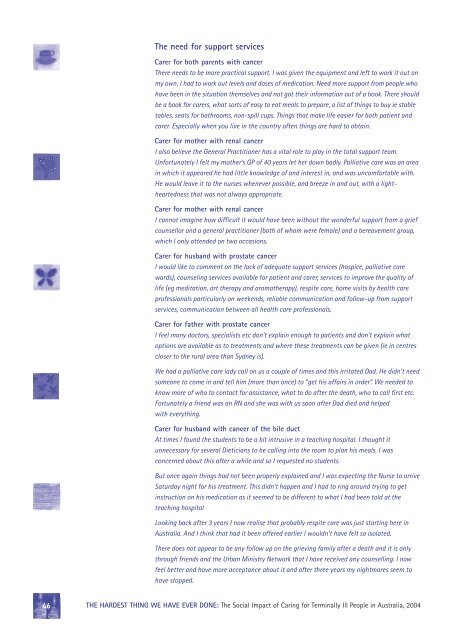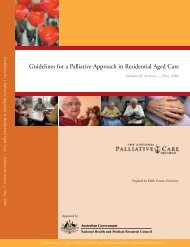The hardest thing we have ever done - Palliative Care Australia
The hardest thing we have ever done - Palliative Care Australia
The hardest thing we have ever done - Palliative Care Australia
You also want an ePaper? Increase the reach of your titles
YUMPU automatically turns print PDFs into web optimized ePapers that Google loves.
<strong>The</strong> need for support services<br />
<strong>Care</strong>r for both parents with cancer<br />
<strong>The</strong>re needs to be more practical support. I was given the equipment and left to work it out on<br />
my own. I had to work out levels and doses of medication. Need more support from people who<br />
<strong>have</strong> been in the situation themselves and not got their information out of a book. <strong>The</strong>re should<br />
be a book for carers, what sorts of easy to eat meals to prepare, a list of <strong>thing</strong>s to buy ie stable<br />
tables, seats for bathrooms, non-spill cups. Things that make life easier for both patient and<br />
carer. Especially when you live in the country often <strong>thing</strong>s are hard to obtain.<br />
<strong>Care</strong>r for mother with renal cancer<br />
I also believe the General Practitioner has a vital role to play in the total support team.<br />
Unfortunately I felt my mother’s GP of 40 years let her down badly. <strong>Palliative</strong> care was an area<br />
in which it appeared he had little knowledge of and interest in, and was uncomfortable with.<br />
He would leave it to the nurses when<strong>ever</strong> possible, and breeze in and out, with a lightheartedness<br />
that was not always appropriate.<br />
<strong>Care</strong>r for mother with renal cancer<br />
I cannot imagine how difficult it would <strong>have</strong> been without the wonderful support from a grief<br />
counsellor and a general practitioner (both of whom <strong>we</strong>re female) and a bereavement group,<br />
which I only attended on two occasions.<br />
<strong>Care</strong>r for husband with prostate cancer<br />
I would like to comment on the lack of adequate support services (hospice, palliative care<br />
wards), counseling services available for patient and carer, services to improve the quality of<br />
life (eg meditation, art therapy and aromatherapy), respite care, home visits by health care<br />
professionals particularly on <strong>we</strong>ekends, reliable communication and follow-up from support<br />
services, communication bet<strong>we</strong>en all health care professionals.<br />
<strong>Care</strong>r for father with prostate cancer<br />
I feel many doctors, specialists etc don’t explain enough to patients and don’t explain what<br />
options are available as to treatments and where these treatments can be given (ie in centres<br />
closer to the rural area than Sydney is).<br />
We had a palliative care lady call on us a couple of times and this irritated Dad. He didn’t need<br />
someone to come in and tell him (more than once) to “get his affairs in order”. We needed to<br />
know more of who to contact for assistance, what to do after the death, who to call first etc.<br />
Fortunately a friend was an RN and she was with us soon after Dad died and helped<br />
with <strong>ever</strong>y<strong>thing</strong>.<br />
<strong>Care</strong>r for husband with cancer of the bile duct<br />
At times I found the students to be a bit intrusive in a teaching hospital. I thought it<br />
unnecessary for s<strong>ever</strong>al Dieticians to be calling into the room to plan his meals. I was<br />
concerned about this after a while and so I requested no students.<br />
But once again <strong>thing</strong>s had not been properly explained and I was expecting the Nurse to arrive<br />
Saturday night for his treatment. This didn’t happen and I had to ring around trying to get<br />
instruction on his medication as it seemed to be different to what I had been told at the<br />
teaching hospital<br />
Looking back after 3 years I now realise that probably respite care was just starting here in<br />
<strong>Australia</strong>. And I think that had it been offered earlier I wouldn’t <strong>have</strong> felt so isolated.<br />
<strong>The</strong>re does not appear to be any follow up on the grieving family after a death and it is only<br />
through friends and the Urban Ministry Network that I <strong>have</strong> received any counselling. I now<br />
feel better and <strong>have</strong> more acceptance about it and after three years my nightmares seem to<br />
<strong>have</strong> stopped.<br />
46 THE HARDEST THING WE HAVE EVER DONE: <strong>The</strong> Social Impact of Caring for Terminally Ill People in <strong>Australia</strong>, 2004
















